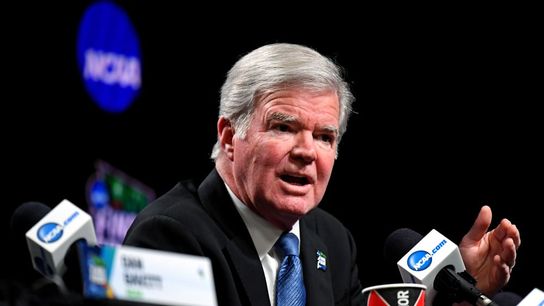Is the NCAA trying to guilt the six remaining conferences into canceling their football seasons? Judging from the recent communications out of the organization's Indianapolis headquarters, one could definitely make the case that they are.
The campaign began Thursday with a conversation between the NCAA's chief medical officer, Dr. Brian Hainline, and a panel representing the Infectious Diseases Society of America.
"When we started talking about return to sport in April, we were envisioning that there would be a continued downward trajectory of Covid-19 new infections and deaths -- that there would be a national surveillance system, national testing and national contact tracing -- that would allow us to really navigate this pandemic into re-socializing both in sport and in the rest of society," Hainline said then. "And that hasn't happened. We're moving into very troubled waters right now. It's a very narrow path to get ball sports right."
That continued Saturday night with an appearance on CNN, where he said this:
"Right now, if testing in the US stays the way it is, there’s no way we can go forward with sports."
The week then culminated with this appearance on the Dan Patrick Show earlier this morning, where Hainline alternated between daring the ACC, SEC, Big 12 and its cohorts to continue with their scheduled football seasons while also threatening them if they do so.
"What's happened is that they've decided to postpone and not make a decision yet," he said. "When they do make a decision, it must follow the mandates that are in the third document we put out. We've put out three documents in the past two and a half months that have guided how the membership can return to sports.
"A month from now, when they're contemplating possibly beginning their schedule, we'll see where we are. But they have to follow the mandates. That would set up a confrontation if the mandates aren't being followed."
He continued:
"The Board of Governors, which is the most powerful committee in the NCAA, they've said every school must follow these mandates. That's what the confrontation would be. I can't predict what would happen with that, but that's where things have been laid out."
Watch for yourself below.
https://www.youtube.com/watch?v=D5uhr4-Xd8A
Hainline is not alone here, either. NCAA president Mark Emmert canceled fall sports championships on Thursday, a move widely viewed on campuses as a way to box the Remaining Power Three into joining the Canceled Two by making football the only fall sport still going.
“We cannot now, at this point, have fall NCAA championships because there’s not enough schools participating,” Emmert said at the time. “The Board of Governors said, ‘If you don’t have half of the schools playing a sport, you can’t have a legitimate championship.’…sadly, tragically, that’s going to be the case this fall, full stop.”
Before we move forward, two things.
First, when Hainline says that it's a narrow path to get "sports" or "ball sports" right, that's objectively untrue. Below is a list of American televised sporting events scheduled just for today. Every major American sporting enterprise has been up and running since last month -- some bubbled, some not -- with the exception of the NFL, and their training camps are now underway.
Second, it's true that those are all professional sports, which the NCAA is not. In fact, 91 percent of NCAA membership has canceled its fall sports season, largely independent of the NCAA.
The issue here isn't whether it's safe to play college sports in this environment, it's the NCAA trying to assert authority it doesn't have in an apparent campaign to convince/coerce/threaten/bully the remaining holdouts to cancel fall sports.
To date, the NCAA itself has done nothing to actually help its member schools put their teams on the field. As Hainline mentioned in the Dan Patrick interview, the organization has been prolific at laying down guidelines they'll have to follow -- including the particularly arduous requirement of quarantining all "high-risk" exposures to confirmed COVID-19 cases for 14 days, which they can't test out of.
All this while the NCAA has provided zero funding for testing to its member institutions.
College football at the FBS level is an entirely self-funded operation -- the schools arrange their own schedules and stage their own postseasons.
By what right, then, does the NCAA have to step in and shut down an FBS football season? What authority do you have over an operation you aren't funding?
None of this has been lost on the people actually working to stage the college football season, or what's left of it.
Or, as one AD told Sports Illustratedlast week: “Stop with this passive aggressive bulls---."
Right now, the NCAA is trying to govern the remaining six conferences with the moral authority of a parent trying to institute a curfew on a 25-year-old child home for Thanksgiving break.
If Emmert, Hainline and the Board of Governors are going to demand the ACC, SEC, et. al., be home by midnight, they have every right to stop in their tracks, turn their heads and ask what's going to happen when midnight rolls around and they're not home.
But perhaps we're viewing this from the wrong perspective. Maybe the folks at the NCAA HQ have heard the same talked we have over these past six months, that the coronavirus has exposed how Power 5 have never needed the NCAA less than they do now. Maybe they've even come to that same realization.
Perhaps that bluster blowing out of Indianapolis isn't anger, but fear.
